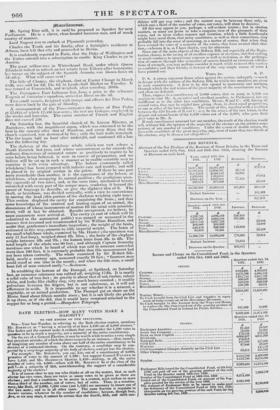BATH ELECTION-HOW MANY VOTES MAKE A MAJORITY?
TO THE EDITOR OF THE SPECTATOR.
SIR- Your last Number, in referring to the Bath election contest, mentions 3Ir. ROEBUCK as "having a minority of at least 1,100 out of 2,000 electors." The Italics and the context make it evident that you consider the 1,100 votes in quesgen to be in truth a majority, not a minority of the entire constituency.
On the eve of a General Election, it maybe worth while to notice a very simple
but Prevalent mistake, of which the above seems to be an instance,-that, namely, of imagining any number of votes above one half of the entire constituency to be decisive of a contested election. On the contrary, a candidate may be sup- ported by a very large majority of the body of electors, and yet lose his election. For example : Mr. ROEBUCK, you say, has, out of a constituency of 2,000, promises of votes to the amount of 1,100: but suppose General PA LIME R to have 1,450, and Mr. HOBHOUSE likewise 1,450-making, in all, the entire number of votes, viz. 4,000-where will Mr. ROEBUCK be at the close of the poll 2-in a minority of 350, notwithstanding the support of a considerable majority of the electors! It is of course clear to any one who thinks at all on the matter, that as each lemurr has two votes, there are twice as many votes to be given as there are electors; and that a candidate, to be secure In a contest, must reckon on more Shame third of the number, not of voters, but of votes. Thus, in a constitu- encyilike Bath, of 2,000, 1,334 votes (not 1,100) are necessary to insure one of 1:he two seats ; and so in all other cases. The same fraction is requisite to =sure success, whatever be the number of candidates; because, though four, .Ave, or six may start, it cannot be certain that the fourth, fifth, and sixth can- didates will get any votes ; and the contest may be between three only, in which case a third of the number of votes, not voters, will alone be decisive.
All this may appear to you, perhaps, a self-evident truism ; but in election matters, so many are 'prone to take a sanguine view of the prospects of their cause, and to incur useless expense and vexation, which a little forethought might have saved them, that many candidates, as well as their committees, very probably fall into the error of assuming, as a matter of course, that when they have secured the votes of a majority of the voters, they have secured their elec- tion,--whereas it is, as I have shown, very far otherwise. Since one of the main objects of the Reform Bill, and especially of the Regis-
tration clauses, is the saving of all needless expense at elections, and that nothing so much conduces to unnecessary expense as well as irritation, as the prolonga- tion of contests through false assurances of success founded on erroneous caleMa- tions of strength, you may perhaps consider it worth while to insert this caution to candidates and their friends, to beware of the very simple source of error I have pointed out.
P. S. A strong argument hence arises against the system, unhappily so much in favour with the authors of the Reform Bill, by which two members are given to each constituency. A door is by this opened to matueuvre and intrigue, through which the real wishes of the great majority of the constituents may be, and often are defeated.
Thus, suppose in a constituency of 2,000 voters, that so many as 1,330 are anxious to send Mr. A, an active and excellent member, to Parliament, but are indifferent as to the other two candidates, Messrs. B and C: still, having all second votes, they may be cajoled into giving them, in about equal proportions, to one or other of the two ciphers. The result of this, together with a coalition between the 670 friends of B and C, may be the return of the two latter, to the disgust and astonishment of the 1,380 voters out of the 2,000, who gave their
first votes to Mr. A.
If each constituency returned but one member, the result of the election would tell, without fail, the opinion of the majority of the electors on the relative com- petency of any number of candidates. Under the system of double return, the .throllrite candidate of the great majority, nay, even of more than two thirds of the electors, may be thrown oat altogether !



























 Previous page
Previous page